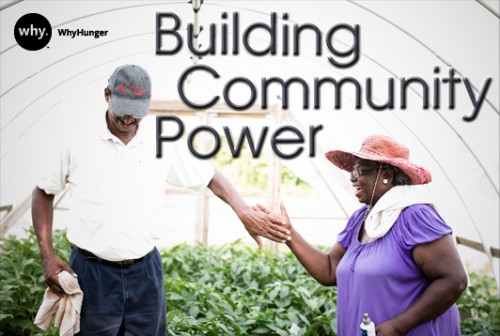 We’re excited to announce the launch of our new online resource, Building Community Power: A Grassroots Approach to Building Regional Networks for Food Justice, and invite you to explore this hub for the stories, resources and impact from WhyHunger’s four-year collaboration with grassroots networks. Meet individuals and organizations from three multisectoral networks working regionally across the nation to build food justice in their communities. Sharing stories is a powerful way to inspire, connect and spark action, and the hub is vibrant with the images and voices of grassroots leaders. Embedded in these stories are resources for strategic planning, network building, and community outreach adaptable to other community food projects, as well as outcomes and reports from WhyHunger and our partners.
We’re excited to announce the launch of our new online resource, Building Community Power: A Grassroots Approach to Building Regional Networks for Food Justice, and invite you to explore this hub for the stories, resources and impact from WhyHunger’s four-year collaboration with grassroots networks. Meet individuals and organizations from three multisectoral networks working regionally across the nation to build food justice in their communities. Sharing stories is a powerful way to inspire, connect and spark action, and the hub is vibrant with the images and voices of grassroots leaders. Embedded in these stories are resources for strategic planning, network building, and community outreach adaptable to other community food projects, as well as outcomes and reports from WhyHunger and our partners.
Stories. Through photo essays and videos, the stories illustrate how combined individual efforts can create powerful collective impact. Each story comes from WhyHunger’s four-year initiative called “Building Community Power for Food Justice.” During the project, WhyHunger’s Grassroots Action Network collaborated with three regional alliances — in southeastern Arizona, the Mississippi Delta, and the central coast of California — to develop local-level solutions and build collective networks between anti-hunger organizations, businesses, sustainable agriculture advocates, farmers, food service directors, community health clinics, and more. Hear from these community leaders and explore how they are transforming their communities.
Resources. Examples of facilitation plans, community mapping reports, strategic planning documents, ideas for communication and outreach and other tools used in these collaborations are ready to be downloaded and reinvented for use in other communities. We hope these tools will support networks working toward food justice across the country.
Impact. Evaluation reports and impact narratives offer insight into the knowledge gained from the initiative, such as the importance of community ownership and multisectoral networks in building sustained, healthy and just food systems. These evaluations include blueprints for successful strategies to strengthen local food systems.
In the spirit of collective impact, the resources in Building Community Power are meant to be shared, explored, and adapted. We invite you to discover these stories and tools at toolkit.whyhunger.org.
Thanks to the W.K. Kellogg Foundation and Kresge Foundation for their support of this project.


